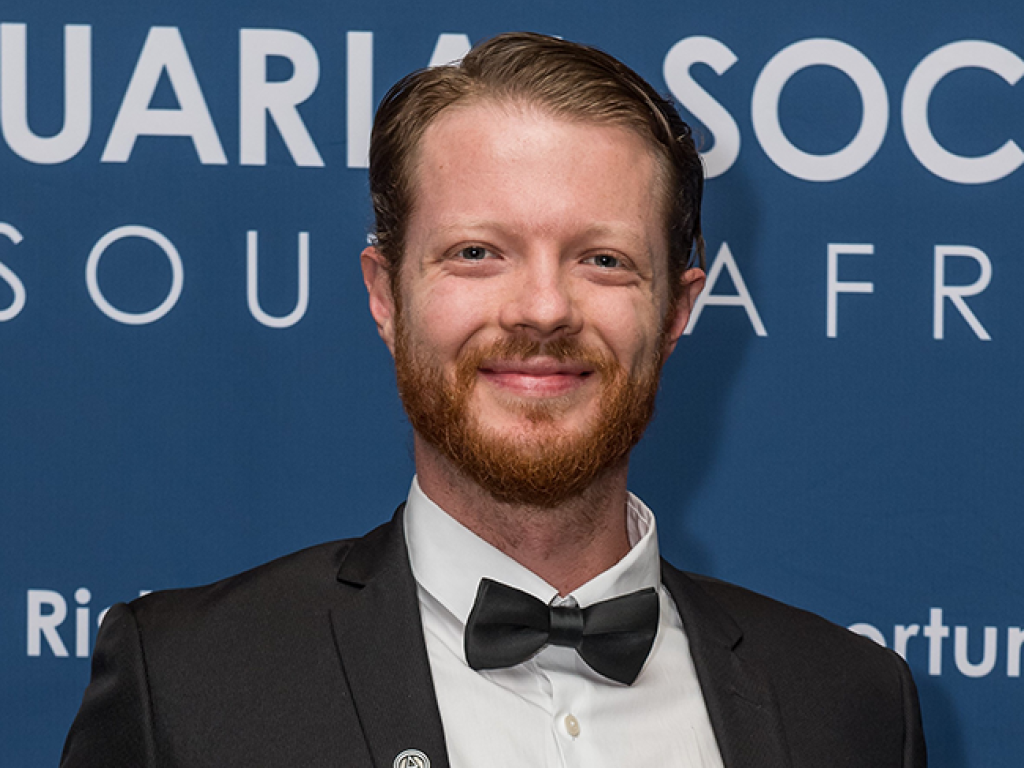Climate risk specialist pays tribute to AIFMRM programme

In his current role as Climate Risk Analytics Manager at Absa Bank, Christopher Sterley is doing ground-breaking work when it comes to building climate risk measurement models, aiming to understand the impact of extreme weather phenomena on financial products. He is a leading voice on climate risk and how it affects banks and insurers – and it all started with his postgraduate studies at AIFMRM.
Chris Sterley recently spoke at the Climate Change Seminar hosted by the Actuarial Society of South Africa. He chaired a panel on climate risk modelling and says it was a great opportunity to discuss what is currently happening in this field as well as talk about developments in an area of finance that is so new that most of the models have to be created from scratch.
“Banks and insurance companies are at the centre of economies; they have access and exposure to government entities as well as customers or ordinary citizens. They can play a critical role in how we manage and mitigate climate change risk,” says Chris, who joined the Absa group five years ago, first as an analyst and now in a managerial role.
A qualified actuary as well, there is no doubt that Chris enjoys mathematical modelling and playing with algorithms. But for him, it has to be about more than the numbers. He wants to make a difference and be part of a positive force for change in society, helping uplift and develop a country with significant challenges to overcome.
This one-time volunteer at township schools and soup kitchens is now using sophisticated mathematical tools to study the effect that climate change is having on the African continent.
“The impacts of climate change are affecting both developing and developed nations around the world,” he says. “This is part of the complexity we are dealing with when discussing climate risk. It is not just about the weather but also the transition risk, the tax on emissions and the fact that some countries have not historically contributed to high emissions yet are suffering more severe effects as a result of altered weather patterns affecting agriculture, food supply, water availability and so on.”
He explains that his job is not about predicting the future so much as explaining results and examining the data that is gathered in great detail and at a much deeper level. “We have to become comfortable with the idea of not knowing what will happen in the future,” he says.
It is this kind of thinking that was honed, especially during his time at AIFMRM. After an undergraduate qualification in actuarial science, he started enquiring about the Master of Financial Engineering (MFE), formerly known as the MPhil specialising in Mathematical Finance. “I was surprised by how consistently positive the feedback was,” he said, referring to conversations with previous graduates of the programme.
“There is so much that is commendable about the programme, but what stands out for me is how I learned to study, properly, during this time. There was such a big focus on understanding what is happening rather than learning how to do something. That was, in a way, a step sideways and it put me in good stead for my job as well as when I progressed towards becoming an actuary.”
Chris says that at AIFMRM, there were always different approaches to understanding what was happening in industry and the real world, which meant that it was not abstract at all. “There was a heavy emphasis on implementation as well as critical thinking in problem-solving. Five years after completing the MFE, I still think it is the cornerstone of my success to date.”
Even though he could work anywhere in the world, he is happy in his current role. “There are many options in South Africa, and I can make a difference here; that is important to me, not just doing a good job, but making things better for others.”
He says for anyone considering whether they should study at AIFMRM, the choice is clear. “If you have the opportunity, you have nothing to lose but everything to gain.”
